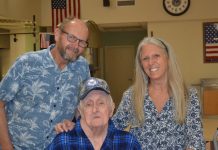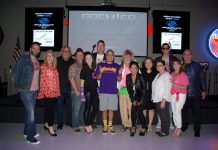By Loreen Berlin
Lou Belanger, a long-time member of the Buena Park Elks Lodge No. 2046 and an Anaheim resident, is being honored for 40 years of membership with the Elks and will soon celebrate his 90th birthday at the Lodge with 150 Elk members, family, and friends.
As a Past District Deputy Grand Exalted Elks Ruler, Belanger has been very active with the Elks over the years. He has also been active for nearly 55 years with the West Anaheim United Methodist Church. Belanger is a WWII Veteran with the Tech 5 (T5) United States Army Signal Corps, serving from 1946 to 1947.
Belanger has lived with Parkinson’s disease for 22 years. Parkinson’s is a neurodegenerative brain disorder that slowly robs people of their mobility, balance, and ability to carry on with daily activity levels. The most well-known feature of the disease is the constant trembling of the limbs.
Belanger joined the musical group Tremble Clefs, directed by Board Certified Music Therapist Karen Skipper. “I would attend every day if I could,” Belanger said. “I love it.” Tremble Clefs, with approximately 45 members in North Orange County, is a community of people with Parkinson’s disease who have a desire to sing and explore the therapeutic value of music, with a goal of enhancing and maintaining vocal and physical skills through vocal exercise and movement.
When Belanger was diagnosed with Parkinson’s, he and his wife went to a Parkinson’s meeting at Hoag Memorial Hospital and happened to hear the Tremble Clefs perform.
“I knew I could meet and enjoy the friendship of the group, though I’m not a great singer,” Belanger said. “My outlook is this: I’m 90 years-old and have Parkinson’s, so I’m doing the best I can, singing and staying positive and attending monthly meetings. We know there’s no cure yet, but who knows?” he said.
The group practices singing for an hour-and-a-half each week. They are rehearsing for two upcoming performances June 29 and July 1. The ultimate hope of the group is that music will help with their everyday speech, because when they sing, their voices and bodies don’t shake.
Tremble Clefs works to promote interaction and communication within the Parkinson’s community of caregivers, families, and patients by sharing music with others in hopes of promoting a better understanding of the disease.
Skipper took over directing the group approximately three years ago when the former director retired. “I have loved every minute of working with this fantastic group of people,” she said. “There’s no special requirement to join the group except an interest, and a great voice isn’t necessary.” Skipper said she directs the group in a variety of music, with everything from Broadway to country, pop, and traditional.
“Caregivers and families are invited to take part in rehearsals and performances,” she said.
The Tremble Clefs program was developed by Karen Hesley, a licensed speech therapist, nearly 15 years ago in Phoenix where Hesley decided to incorporate singing into her treatment of voice disorders in people with Parkinson’s disease.
Recent findings show that music therapy is a new and effective method in treating Parkinson’s disease. The Neurosciences division of Hoag Memorial Presbyterian Hospital in Costa Mesa has reported that, “Active music therapy in Parkinson’s disease is a possible integrative method for motor and emotional rehabilitation.”
They also say that, “By recognizing and charting the concretely established avenues of music/body neuronal communication, music may be capable of bringing functional movement back to a body that is motion-impaired and asks, could understanding of how brains and bodies are connected through musical interaction enable the medical field to bring purposeful motion – a vital component of every living being’s existence – to those plagued with dysfunctional mobility?”
Modern management of Parkinson’s disease aims to obtain symptom control, to reduce clinical disability, and to improve the quality of life. Music acts as a specific stimulus to gain motor and emotional responses by combining movement and stimulation of different sensory pathways.
A conclusion is that music therapy is effective on motor and behavioral functions and is being proposed as an active and new method for inclusion in PD rehabilitation programs.
One of the latest findings is that vigorous exercise can slow the progression of Parkinson’s.
Singing is noted for helping people with Parkinson’s to speak louder and more clearly, breathe more efficiently and improve the ability to swallow.
For Tremble Clefs information, visit www.trembleclefs.com.
To contact Director Karen Skipper, MT-BC, e-mail kmsmusic@cox.net











